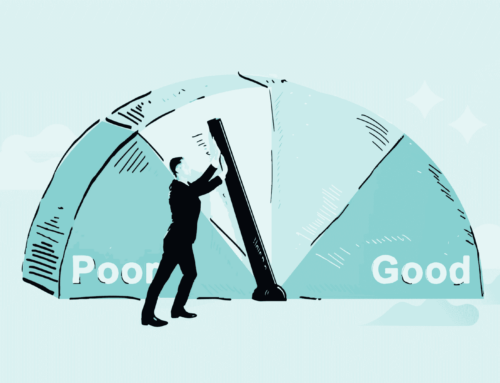Your personal credit score speaks to your financial situation in a standardized way. When you apply for a new loan or any form of credit, the lender will naturally be interested in learning about you. Credit scores give lenders a unique insight into everything from how many credit accounts you have to your history of debt management. By using set parameters to assess your credit, lenders avoid discrimination and ensure responsible risk management.
What is a Credit Score?
Your credit score is a number assigned to represent your success with managing credit to date. It goes back several years and offers a relatively complete picture of your financial situation. There are two credit agencies in Canada. The first is Equifax and the second is TransUnion. Taken together, these two agencies offer a complete assessment of your financial situation in terms of credit. This number (your credit score) gives lenders an idea of how creditworthy you are.
What is a Good vs. Bad Credit Score?
Depending on the type of loan you’re pursuing, the threshold for credit will be different. Some loans, for example, payday loans, don’t require a credit check. Other examples are rent-to-own furniture and home supplies. However, car loans, mortgages, and credit cards all take your score into consideration. Every credit profile is issued an exact number. These numbers are sorted into ranges, specifically:
- 750 and 800: Excellent
- 700 and 749: Good
- 650 and 700: Fair
- 300 and 649: Bad
What Makes up Your Credit Score?
Each credit bureau has its own unique formula for determining your credit score, but we do know that both take five major factors into account when calculating your score.
Payment History
By looking at your track record in terms of making payments, creditors can tell a great deal about your financial management. One aspect is whether you make your payments on time. This is a major consideration. The next criteria is whether you make full or partial payments. In gaining an understanding of whether you have a history of default, lenders can assess your relative level of trustworthiness.
Debt & Credit Utilization
The amount of debt you carry on a monthly basis is another important factor that greatly affects your credit score. Within this category, your credit utilization ratio is also considered. This ratio compares your available credit limit to your balance to showcase how reliant you are on credit.
Length of History
This component is especially important to those who may not have cultivated a credit score yet. Often, the absence of a credit file makes it just as difficult as poor credit to get a loan. Many think that, since they’ve never had debt, it makes them less risky to lenders. It’s actually the opposite. A credit history, showing that you’ve had debt and paid it off, is far more useful than a background without any debt.
Credit File Inquiries
The next criteria is used to see how many lenders and creditors have checked your credit. This gives the lender an idea of your financial dealings, have you applied for a lot of new credit recently? If so this could illustrate to potential lenders that you are struggling financially. When a lender or creditor pulls your credit it is called a hard inquiry. It shows up on your credit report and damages your score slightly.
Credit Diversity
Diversity is a factor when determining the strength of your credit profile. Determined by the types of credit you have, a more diverse credit profile highlights your responsibility. It showcases that you exercise responsibility and have proven successful with the time-management and money-management required to upkeep different credit accounts.
Why Do Lenders Check Your Credit Score?
All sorts of lenders check your credit rating. There are, in fact, very few credit arrangements where the lender will not investigate your credit rating. There is a difference between a soft and hard credit check. The former looks mostly at your score, basically taking a passing glance to see if you fall into an acceptable category. Larger loans, like those for a vehicle or a home, will look into all of the above specifics, taking a detailed look at your financial history.
To Check Your Credit Worthiness
Basically, creditors look into your credit history as a way of assessing whether you are trustworthy financially. Issuing a loan comes with a certain level of risk. The profit comes from the interest, and responsibly recuperating the funds involves getting regular payments. It only makes sense that a lender will seek out a creditworthy individual to whom they can comfortably lend. In essence, creditworthiness means that you have a proven track record of making your payments on time and in full
How do Lenders Use Your Credit Score?
After learning your credit score, lenders use the information to determine a couple of things. The first is learning how much the creditor can issue as a loan. For instance, if you have a higher credit score, it shows that you are a better risk. Those with ‘excellent’ credit ratings will be able to access more funds through a loan simply because they are more creditworthy. The other thing that’s determined is the interest rate they will apply. With higher-risk individuals, the lender will apply a higher rate of interest. Ultimately, the profit for the lender comes from these interest payments. In order to recuperate their funds in a way that accounts for the increased risk of issuing a loan to someone with a low credit score, lenders apply higher interest rates.
Who Else Checks Your Credit Score?
It’s not only lenders who investigate your credit score. Since it serves as a good representation of your payment history and overall financial landscape, other professionals take it into consideration as well.
- Jobs: When you’re seeking employment, though it is not standard, the prospective employer may request a credit check in certain situations. This is typically when the role entails money-related responsibilities, like a banker or a realtor.
- Landlords: Landlords use your credit score to determine if you are likely to pay your rent regularly, on time, and in full. It gives them an idea of your trustworthiness as a tenant, from a financial perspective.
- Cell phone companies: When entering into a cell phone contract, credit checks are often requested. While not all service providers request a credit check, many do. Bear in mind that, in order for the cell phone company to check your credit, you must give them permission to do so.
- Insurance: Certain insurance companies check into your credit in order to establish whether or not you are creditworthy. However, in certain Canadian provinces, this practice is prohibited. New Brunswick has made it entirely illegal for any insurance company to check credit. Alberta and Ontario prohibit credit checks when applying for car insurance.
How Can You Ensure You Have a Good Credit Score?
- Monitor Credit: The best way to be sure that you can keep a good credit score is to check it on a regular basis. There are companies that can give insight without the difficulty of getting your Equifax and TransUnion records each month. Keep an eye on your score, along with the information on your file. Make sure that it is correct and that you are growing your score as much as possible.
- Pay bills on time and in full: The key to maintaining a stable credit score is to pay your debt in full, on time, without fail. This simple step will prevent you from a decreasing credit score, though depending on the bills you’re paying, it won’t necessarily grow the score.
- Credit utilization ratio: You have a credit limit but you seldom need to use all of it. To get your credit score higher, a good step is to pay off more of your debt. Consider your credit card. Instead of making minimum payments, put large amounts down. Try to pay off your purchase as soon as you make it to improve your overall score.
- Credit boosting products: Finally, if you are struggling to grow your credit score, a key step is to seek out a tool specifically designed to improve credit. Secured credit cards require you to put a certain amount down, yet still, work as a credit card. Over time, with regular payments, your score will steadily climb. You can leverage this growth into unsecured cards which can also be used to grow your credit.
Final Thoughts
Equipped with a thorough understanding of how credit scores work and why lenders rely on them, you can position yourself properly. By cultivating a good credit profile, and understanding how lending, you can increase your access to loans in the most responsible way possible.
Written by Loans Canada for Marble Financial.






